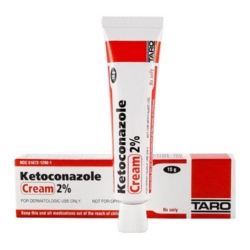Ketoconazole 2% Cream
SKU : 55448_-RX

Price: $17.95
Save 15% on your first Autoship order
+ Save on each recurring order!
+ Save on each recurring order!
Veterinarian Prescription (Rx) Required
Free Shipping on orders over $75
Low Price Match Guarantee
Free Shipping on orders over $75
Low Price Match Guarantee
- Can used in both cats and dogs
- Treats serious fungal infections
- It may also be used against some yeast and dermatophyte ringworm infections
How to Order Prescriptions
Supports
Description
Ketoconazole Cream 2 % is used in both cats and dogs to treat serious fungal infections. It may also be used against some yeast and dermatophyte ringworm infections.Supports
- Can used in both cats and dogs
- Treats serious fungal infections
- It may also be used against some yeast and dermatophyte ringworm infections
Dosage and Administration
Please read the entire package insert and follow your Veterinarian's prescription.
It is common for fungal infections to require several weeks of treatment. The duration of administration depends on the condition being treated, response to the medication and the development of any adverse effects. Be certain to complete the prescription unless specifically directed by your veterinarian. Even if your pet feels better, the entire treatment plan should be completed to prevent relapse or prevent the development of resistance. treatment of serious fungal infections. It may also be used against some yeast and dermatophyte ringworm infections.
It is common for fungal infections to require several weeks of treatment. The duration of administration depends on the condition being treated, response to the medication and the development of any adverse effects. Be certain to complete the prescription unless specifically directed by your veterinarian. Even if your pet feels better, the entire treatment plan should be completed to prevent relapse or prevent the development of resistance. treatment of serious fungal infections. It may also be used against some yeast and dermatophyte ringworm infections.
Ingredients
Ketoconazole 2%
Possible Side Effects
While generally safe and effective when prescribed by a veterinarian, ketoconazole can cause side effects in some animals.
Ketoconazole should not be used in animals with known hypersensitivity or allergy to the drug. Ketoconazole may interact with other medications.
Consult with your veterinarian to determine if other drugs your pet is receiving could interact with ketoconazole.
Such drugs include antacids, cimetidine, cisapride, methylprednisolone, anticonvulsants, heart medications, cyclosporine and theophylline.
The most serious adverse effect is that which affects the liver hepatitis.
Signs of decreased appetite, jaundice, vomiting or diarrhea should be reported to your veterinarian.
Ketoconazole may cause vomiting, diarrhea and decreased appetite.
Ketoconazole has caused changes in the hair coat of animals, causing a lightening of the hair color in dogs and a drying of the hair coat in cats.
Eye problems cataracts have been associated with administration of ketoconazole in dogs. Ketoconazole inhibits the hormone synthesis in animals and treated animals have decreased levels of cortisol cortisone, testosterone and other sex hormones.
These changes may affect reproduction and cause some animals to appear depressed or lethargic.
Do not administer ketoconazole to a pregnant animal because it has caused fetal death.
Ketoconazole should not be used in animals with known hypersensitivity or allergy to the drug. Ketoconazole may interact with other medications.
Consult with your veterinarian to determine if other drugs your pet is receiving could interact with ketoconazole.
Such drugs include antacids, cimetidine, cisapride, methylprednisolone, anticonvulsants, heart medications, cyclosporine and theophylline.
The most serious adverse effect is that which affects the liver hepatitis.
Signs of decreased appetite, jaundice, vomiting or diarrhea should be reported to your veterinarian.
Ketoconazole may cause vomiting, diarrhea and decreased appetite.
Ketoconazole has caused changes in the hair coat of animals, causing a lightening of the hair color in dogs and a drying of the hair coat in cats.
Eye problems cataracts have been associated with administration of ketoconazole in dogs. Ketoconazole inhibits the hormone synthesis in animals and treated animals have decreased levels of cortisol cortisone, testosterone and other sex hormones.
These changes may affect reproduction and cause some animals to appear depressed or lethargic.
Do not administer ketoconazole to a pregnant animal because it has caused fetal death.






